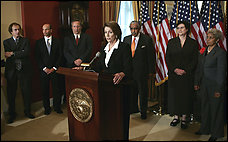Staffing Shortage Hinders Treasury's Progress

Lee Sachs may withdraw from consideration for a Treasury post.
(Lawrence Jackson - AP)
Discussion Policy
Comments that include profanity or personal attacks or other inappropriate comments or material will be removed from the site. Additionally, entries that are unsigned or contain "signatures" by someone other than the actual author will be removed. Finally, we will take steps to block users who violate any of our posting standards, terms of use or privacy policies or any other policies governing this site. Please review the full rules governing commentaries and discussions. You are fully responsible for the content that you post.
|
Tuesday, March 10, 2009
A shortage of staff at the Treasury Department is taking a toll on its ability to deal with a financial crisis that continues to deepen in scope and complexity, government and industry officials said.
Every key position within the Treasury, with the exception of Secretary Timothy F. Geithner, remains vacant or awaits confirmation.
The latest worry in the department concerns Lee Sachs, who was in line to be undersecretary for domestic finance or take a job of similar prominence at the Treasury requiring confirmation by the Senate. Sachs is now contemplating withdrawing from consideration, two sources familiar with the matter said. The reasons remain unclear. Sachs did not respond to requests for comment.
Sachs, who served in the Clinton administration as assistant Treasury secretary for financial markets, is now one of the core members of Geithner's team. Shortly after the presidential election, Sachs emerged as the transition team's key contact at the Treasury and has since been a counselor to Geithner, a position he could retain without Senate confirmation.
But some additional help for the Treasury is on the way. Lael Brainard, deputy national economic adviser under Clinton and who was set to take a post at the State Department, instead is expected to be nominated as undersecretary of the Treasury for international affairs, administration sources said yesterday.
Caroline Atkinson, a former World Bank official, had been the leading candidate for the Treasury job but withdrew from consideration recently.
Some within government and various industries have said the thin ranks at the top of the department have made it a challenge to get the ear of senior Treasury staff.
"There are a couple of go-to people there trying to do five different jobs," said Federal Deposit Insurance Corp. Chairman Sheila C. Bair, who frequently deals with the agency. "I do think that's a real issue. . . . I think being unable to get their own people has hampered their ability."
Treasury officials maintained that the lack of staff has not affected their ability to develop programs to address the financial crisis. In just over a month, they noted, officials have announced a plan to help homeowners, a stress test to capitalize banks in case the economy worsens and an initiative to restart the consumer lending markets. Treasury officials also played a key role on the federal budget announced last month and are working on an initiative to tackle the toxic assets clogging the books of banks as well as a plan to overhaul financial regulation.
"In just weeks since taking office and inheriting the worst economic crisis in generations, we have taken an unprecedented level of action to strengthen our economy," said Treasury spokesman Isaac Baker. "Any rumors of vetting problems or delays in the process are simply not true."
But some prospective candidates for Treasury posts have been held up because the White House is carefully examining every candidate to avoid the kind of embarrassing tax problems that dogged Geithner and other nominees, sources familiar with the matter said. During Geithner's vetting process, the administration found that he had not paid some of the taxes he owed for his work at the International Monetary Fund, and that revelation sparked some opposition to his candidacy on Capitol Hill.
The sources added that the agency is also facing difficulties recruiting financial experts because of rules that require senior Treasury officials to divest of their investments. With the markets plummeting, some candidates have been reluctant to sell their holdings and come to the department.
Annette Nazareth, a partner at law firm Davis Polk & Wardwell who was being vetted for deputy Treasury secretary earlier, dropped out of the process. A government source said the White House was concerned that lawmakers would criticize the choice of Nazareth because she was responsible for overseeing the financial markets at the Securities and Exchange Commission during the credit boom that led to the current financial crisis. But some congressional aides said they were puzzled by this explanation, questioning why White House officials let her vetting process proceed if they already knew about Nazareth's history at the SEC.
The administration is vetting H. Rodgin Cohen, a prominent New York attorney and chairman of the white-shoe law firm Sullivan & Cromwell, as a possible candidate for deputy secretary, sources said.
The administration over the weekend forwarded three Treasury nominees to the Senate Finance Committee: Princeton professor and economist Alan Krueger would head economic policy; David Cohen, an attorney who hails from the law firm WilmerHale, would be in charge of fighting terrorism financing; and Kim Wallace, who worked at Barclays Capital and Lehman Brothers, would oversee legislative affairs.
Staff writer Al Kamen contributed to this report.


